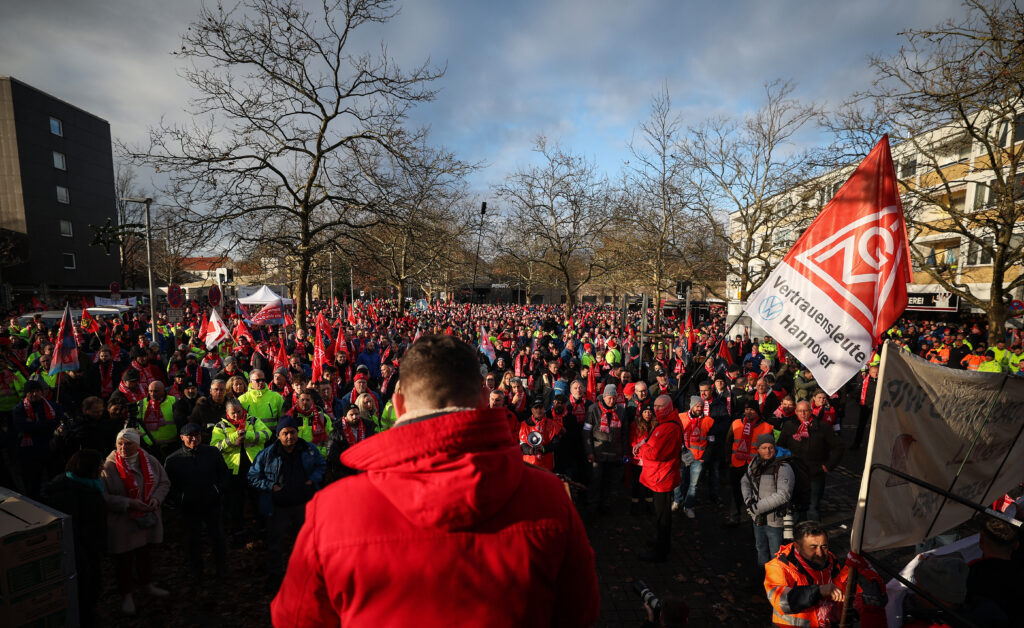Brussels – There is no sign of stopping the automotive sector crisis involving the Volkswagen Group in Germany. After threatening to close numerous factories, workers and unions in the metal sector responded today (Dec. 2) with protests and strikes.
The closure of factories, which would involve cutting thousands of jobs, is a huge problem for German workers, adding to the absence of an understanding on collective agreements. The Ig Metal union has organized “warning strikes” at almost all group locations, including the automaker’s headquarters in Wolfsburg.

According to Agence France Press (AFP) reports, this decision could be the “first stage of a social movement that could reach unprecedented proportions.” The unions have no intention of letting up, as they had preannounced.
“Volkswagen has set fire to our collective agreements, and instead of putting out this fire in three collective bargaining sessions, the Board of Directors is throwing barrels of gasoline on it,” are the very firm words of the head of Volkswagen’s internal collective bargaining team Thorsten Gröger. Even clearer is the warning coming from Gröger: “If necessary, this will be the toughest collective bargaining battle Volkswagen has ever seen.”
The question has been pending since September when the Volkswagen Group announced that it had to make decisions to remain competitive in the market due to excessively high production costs and difficulties in making its investment in electrics pay off. According to Volkswagen division head Thomas Schaefer, the drastic decision to close “deadwood” plants came after finding that production costs are “currently 25 to 50 per cent higher” than expected.
Germany’s zero growth was the starting point of the crisis, but it is the first time in Volkswagen’s history that the decision was made to take action on domestic factories. Three (unsuccessful) negotiations with the unions have gone nowhere, and the fourth round, according to AFP reports, will be on December 9 with suboptimal preconditions, given Volkswagen management’s rejection of a counteroffer from the unions, described as “unworkable.”
The economic crisis of one of Germany’s iconic brands is unfolding in parallel with a significant political crisis, with the collapse of the governing coalition and the calling of early elections. After the fall of the government of the now ex-chancellor Olaf Scholz, the debate on how to revive German industry is taking place in the political arena. In the run-up to the February 23 election, candidates will have to focus on a convincing strategy for the industry, which remains the driving force behind German exports, not forgetting Germany’s European commitments.
Italy watches, concerned. PD calls for “urgent initiative” from Brussels
This crisis is spreading like wildfire, striking even in other European countries, such as Italy, where the resignation of Carlo Tavares, the CEO of Stellantis Group (which includes several Italian brands, including Fiat and Lancia), is worrying.
“In Germany, trade unions are reacting strongly, announcing the largest strike in the history of the Volkswagen Group,” say MEPs of the Democratic Party. From the EU, democratic MEPs call for protecting workers without scapegoating the Green Deal and abandoning the green transition to solve an industrial crisis. They expect from the Commission “an urgent initiative in which it is clarified as soon as possible how the crisis in the automotive sector will be approached and how the green transition of the automotive sector will be supported.”
“The crisis is European, as evidenced by the strikes in Germany and the factory closures in Belgium, and a European response is needed,” said 5-Star Movement MEPs Gaetano Pedullà and Pasquale Tridico. The two EU MEPs continue, “No windfall funding but precise conditionalities that allow the automotive sector to plan the necessary investments required for electric cars.” Great expectations for the EU and its new executive headed again by von der Leyen. The new commissioners, including the much-discussed Teresa Ribera on green transition but also Apostolos Tzitzikostas in charge of transport, will have to prove that they are up to the challenges that lie ahead in the automotive sector, which now, more than ever, needs a common strategy to avoid becoming a black hole for the European economy.
English version by the Translation Service of Withub






